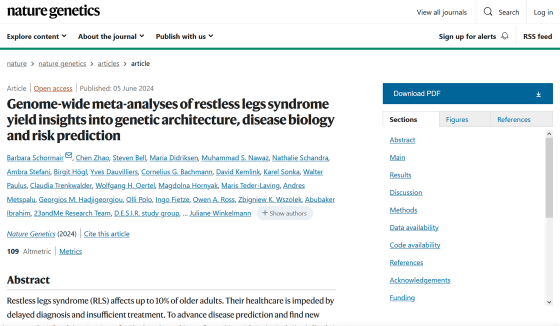Gene hotspots linked to restless legs syndrome, a sleep disorder, identified

Genome-wide meta-analyses of restless legs syndrome yield insights into genetic architecture, disease biology and risk prediction | Nature Genetics
https://www.nature.com/articles/s41588-024-01763-1

Genetics study points to potential treatments for restless leg syndrome | University of Cambridge
https://www.cam.ac.uk/research/news/genetics-study-points-to-potential-treatments-for-restless-leg-syndrome
Restless legs syndrome tied to 140 'hotspots' in the genome | Live Science
https://www.livescience.com/health/genetics/restless-legs-syndrome-tied-to-140-hotspots-in-the-genome
Restless legs syndrome, also known as Ekbon syndrome, causes tingling and itching mainly in the legs, and sometimes an unpleasant sensation as if something is tracing the body, and the patient experiences a strong urge to move the legs. These sensations tend to occur when the patient is still or lying down, and are known to easily cause sleep disorders.
It is said that up to 10% of the population in the United States suffers from restless legs syndrome, and in Japan, the incidence is lower than in Europe and the United States, but it is thought that 3-4% of the population suffers. However, despite being a relatively common condition, restless legs syndrome tends to be overlooked, and its cause is not well understood.
A new international research team analyzed data from three genome-wide association studies that compared DNA from people with and without the characteristic disease to identify genetic loci associated with an increased risk of developing restless legs syndrome. The data analyzed in this study included DNA data from approximately 116,000 people with restless legs syndrome and more than 1.5 million people without the condition.
Previously, 22 genetic loci were known to be associated with restless legs syndrome, but this analysis identified more than 140 new genetic loci associated with an increased risk of restless legs syndrome.

Restless legs syndrome is known to be more prevalent in women than in men, and three of the newly identified loci were on
In addition, this study also investigated which of the newly discovered gene loci may be targeted by existing therapeutic drugs. As a result, 13 gene loci targeted by existing therapeutic drugs were found, two of which were related to glutamate receptors . Preliminary clinical trials suggest that targeting these two genes with antiepileptic drugs may improve restless legs syndrome.
In addition, it is generally believed that low blood iron levels reduce the secretion of the neurotransmitter dopamine, increasing the risk of developing restless legs syndrome, but this study did not find a strong genetic association between iron metabolism and restless legs syndrome. Emanuele Di Angelantonio of the National Institute for Health Research, a co-author of the paper, commented, 'It is surprising that we did not find a strong genetic association with iron metabolism in our study, as low iron levels are thought to trigger restless legs syndrome. These relationships may be more complex than thought and further research may be needed.'

'This is the largest study ever into a common yet poorly understood condition,' said study co-author Stephen Bell , an epidemiologist at the University of Cambridge. 'Understanding the genetic basis of restless legs syndrome could lead to better ways to manage and treat the disease, improving the lives of millions of people around the world.'
Related Posts:
in Science, , Posted by log1h_ik







